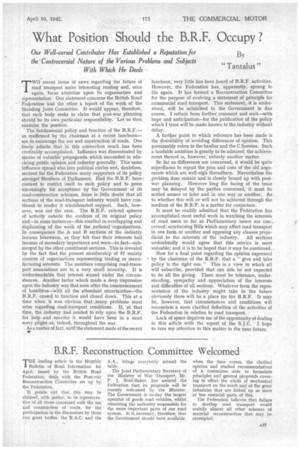What Position Should the B.R.F. Occupy ?
Page 29

If you've noticed an error in this article please click here to report it so we can fix it.
Our Well-versed Contributor Has Established a Reputation for the Controversial Nature of the Various Problems and Subjects With Which He Deals By
"Tantalus "
TWO recent items of news . regarding the future 01 road transport make interesting reading and, once again, focus attention upon its organization and• representation. One statement concerns the British Road Federation and the other a report of the work of the Standing Joint Committee. It would appear, therefore, that each body seeks to claim that post-war planning should be its own particular responsibility. Let us then examine the position.
The fundamental policy and function of the B.R.F,as reaffirmed by the chairman at a recent luncheon— are to encourage the use and construction of roads. One freely admits that in this connection much has been creditably accomplished. Influence was disseminated by means of valuable propaganda which succeeded in educating public opinion and industry generally. This same influence spread also into political circles and, doubtless, secured for the Federation many supporters of its policy amongst Members of Parliament. Had the B.R.F. been , content to restrict itself to such policy and to press unceasingly for acceptance by the Government of its road-construction schemes, there is little doubt that all sections of the road-transport industry would have continued to render it wholehearted support. Such, however, was not the case. The B.R.F. entered spheres of activity outside the confines of its original policy and—in some instances—this resulted in overlapping and duplicating of the work of the national–organizations. In consequence the A and B sections of the industry became lukewarm, as they felt that their interests had become of secondary importance and were—in fact—submerged by the other constituent sections. This is revealed by the fact that the present membership of 57 mainly consists of organizations representing trading or manufacturing interests. The members comprising road-transport associations are in a very small minority. It is understandable that interest waned under the circumstances. Another factor which made a deep impression upon the industry was that soon after the commencement of hostilities--with all the attendant uncertainties—the B.R.F. ceased to function and closed down. This at a time when it was obvious that many. problems must arise regarding road-transport conditions. If, at that time, the industry had needed to rely upon the B.R.F. for help and succour it would have been in a most sorry plight" a, indeed, throughout the war.
As a matter of fact, until the statement made at the recent •
luncheon, very little has been heard of B.R.F. activities. However, the Federation has, apparently, sprung to life again. It has formed a Reconstruction Committee for the purpose of evolving a statement of principle for ,commercial road transport. This statement, it is understood, will be submitted to the Government in due course. I refrain from further comment and wait—with hope and anticipation—for the publication of the policy which I trust will be made known to the industry without delay.
A further point to which reference has been made is the desirability of avoiding differences of opinion. This presumably refers to the haulier and the C licensee. Such a laudable ambition is greatly to be admired; the achievement thereof is, however, entirely another matter,
So far as differences are concerned, it would be quite superfluous to repeat the pros and cons of the old arguments which are well-nigh threadbare. Nevertheless the _problem does remain and is closely bound up with postwar planning. However long the facing of the issue may be delayed by the parties concerned, it must be settled sooner or later and in one way or another. As to whether this will or will not be achieved through the medium of the B.R.F. is a matter for conjecture.
It must be readily admitted that the Federation has accomplished most useful work in watching the interests Of road users so far as Parliamentary issues are concerned; scrutinizing Bills which may affect road transport in one form or another and opposing any clauses preju
dicial to the interests of the industry. All sections undoubtedly would agree that this service is most valuable; and it is to be hoped that it may be continued. Now for a final point regarding the opinion expressed • by the chairman of the B.R.F. that a " give and take policy is the right 'one." This is a view to which all will subscribe, provided that one side be not expected to do all the giving. There must be tolerance, understanding, sympathy and appreciation of the interests and difficulties of all sections. Whatever form the representation of the industry might take in the future obviously there will be a place for the B.R.F. It may be, however, that circumstances and conditions will necessitate a more clarified definition of the activities of the Federation in relation to road transport. • Lack of space deprives me of the opportunity of dealing in this article with the report of the S.J.C. I hope to turn my attention to this matter in the near future.




















































